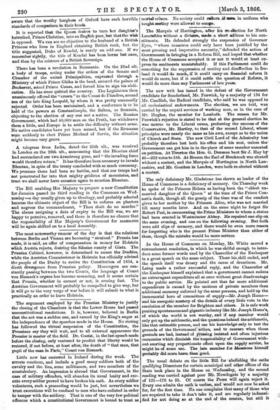In the House of Commons on Monday, Mr. White moved
a retrenchment resolution, in which he was skilful enough to intro- duce some former words used by the Chancellor of the Exchequer in a great speech on the same subject. There his.skill ended, and the speech itself was dreary and the cause of dreariness. Mr. Laing made a rather successful reply, and the Chancellor of the Exchequer himself explained- that a government cannot reduce an extravagant expenditure all at once without great disadvantage to the public service. He pointed out that far more additional expenditure is caused by the motions of private members than additional economy enforced by the same persons, and held up the immemorial hero of committees of supply—Mr. Joseph Hume— and his energetic mastery of the details of every little vote to the emulation of the member for Brighton and others. It is safe work praising spontaneous and gigantic industry like Mr. Joseph flume's, of which the world is not worthy, and if any member would only get up the arithmetic, and the questions behind the arithmetic, like that estimable person, and use his knowledge only to test the grounds of the Governmenraction, and to censure when those grounds are bad, instead of pressing isolated and often injurious economies which diminiah the. responsibility of Government with- out exerting any proportionate effect upon the supply service, he might be of some use. The late member for Montrose himself probably did more harm than good.






























 Previous page
Previous page